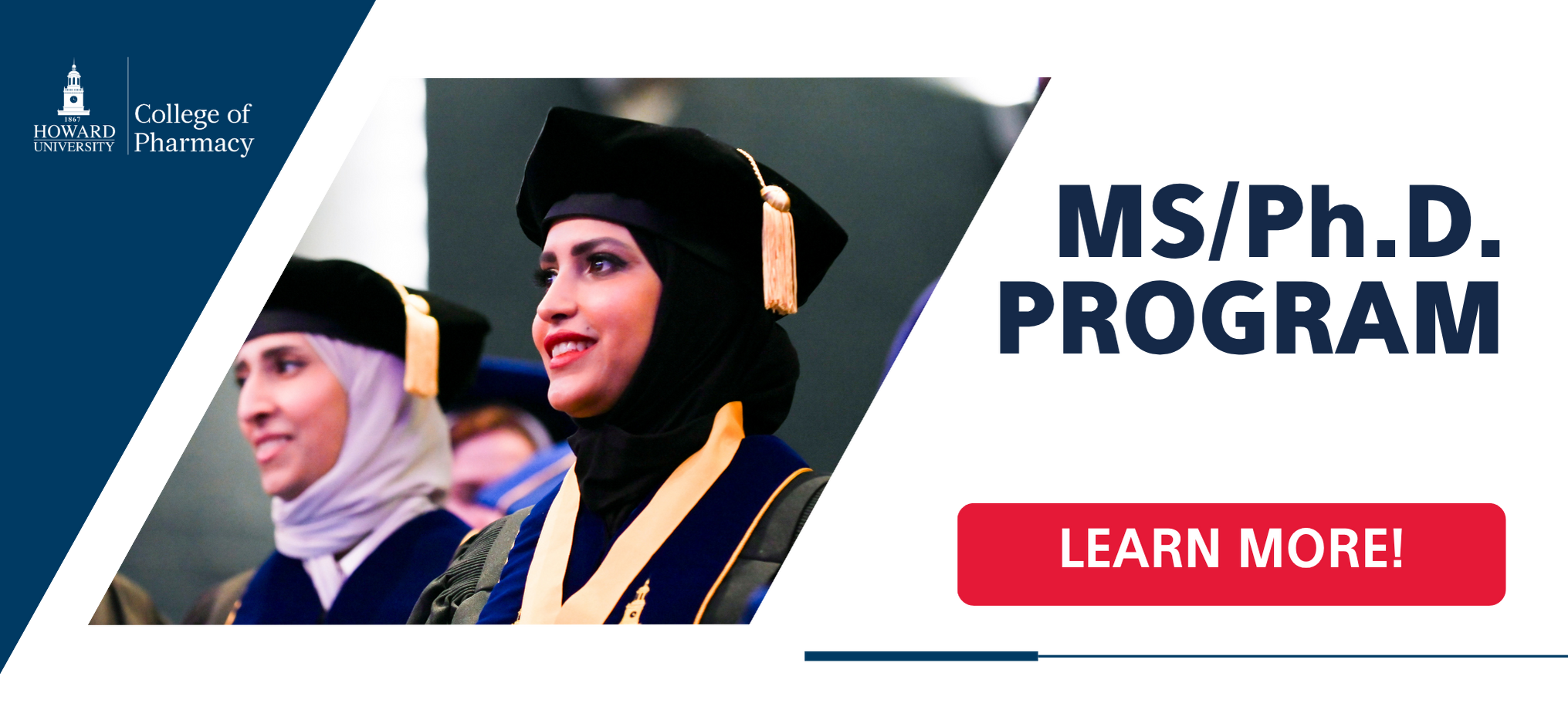Assistant Dean of Graduate Programs & Industrial Partnerships
Graduate & Fellowship Programs
Howard University College of Pharmacy
earl.ettienne@Howard.edu
MS & Ph.D. Pharmaceutical Sciences Graduate Program

We invite you to become part of the Howard University legacy. Howard's excellent multicultural faculty and student body are a microcosm of cultures, ethnicities, and racial groups. They help to make Howard an institution of global diversity and perspective that complements its historical tradition and mission. Howard University's legacy is that of an institution, which prepares its graduates to seek truth and provide service to communities around the world. We invite you to become a part of that legacy.
Our mission is to provide pharmacy education of excellent quality to students with high academic, scholarship and leadership potential, with particular emphasis upon the recruitment, retention and graduation of promising African-American and other ethnically-diverse minority students.
The College of Pharmacy currently offers
- a four-year entry level, Doctor of Pharmacy (Pharm. D.) degree program;
- a five-year Pharm.D./MBA dual degree program;
- a BS/Pharm.D. program with 14 feeder institutions
- a two-year post B.S. Pharm. D. degree program and a Non-Traditional Pharm. D. degree program to registered pharmacists
- a four-year Ph.D. degree in Pharmaceutical Sciences with three tracks:
- a Pharmacy Administration track
- a Medicinal Chemistry track
- Pharmaceutics track
Pharmaceutical Administration Track
Examining effectiveness and costs of medications, how patients take medications, and how policies affect health outcomes
The Pharmacy Administration track is committed to excellence in developing pharmacy professionals that combine the use of health services research, education, and service to advance health care systems, governmental policies, and regulatory agencies tasked with ensuring the optimal use of medications with the goal of improving human health. Moreover, in line with the mission of Howard University, our professionals will gain experience in using their expertise to address health disparities that impact our communities.
Key challenges that must be addressed to optimize medication use include:
- Ensuring that all people have the knowledge, skills, and resources needed to use medications appropriately
- Personalized medication treatment to ensure optimal effectiveness, safety and value in real world settings.
- Promoting informed and shared decision making so that prescribed medication regimens reflect patients’ values, preferences and needs.
Addressing these complex issues requires an interdisciplinary approach aimed at expanding scientific knowledge and translating this knowledge into solutions that improve optimal medication use.
Research
Our scientific interests are diverse and span key and innovative areas in contemporary outcomes research:
- Communication and Decision Making
- Comparative Effectiveness
- Health Disparities
- Medication Utilization
- Patient Centered Outcomes
- Pharmaceutical Policy Analysis
- Pharmacogenomics
- Regulatory Affairs
Medicinal Chemistry Track
Research in the Howard University Medicinal Chemistry Track spans activities in contemporary chemical biology and drug discovery and blends the principles and experimental techniques of chemistry and biology with computational science. While maintaining a traditional emphasis on the drug candidate, we integrate contemporary biological methods to merge small molecule and target biomolecule research. This approach allows for elucidation of disease pathways and mechanisms of drug action. Our program encompasses nearly all aspects of drug discovery, including bioactive natural products, organic chemistry, computational drug design, assay development, high throughput screening of chemical libraries, and studies in living cells.
Pharmaceutics Track
Delivering new methods of targeted drug delivery to optimize therapeutic efficacy of drugs and vaccines
Pharmaco-engineering and molecular pharmaceutics deals with delivering and maintaining the desired amount of a therapeutic agent at the target site for a desired period of time and with cell-based therapies. The development of a drug or vaccine delivery system that accomplishes this is based on an understanding of their transport properties across biological barriers and subsequent biodistribution as well as the mechanism by which they are metabolized and eliminated. These drug-delivery systems are tested in cell-based functional assays and/or human disease models in animals. As such, pharmacokinetic and pharmacodynamic assessments are the measure of performance of a given delivery system. The pharmacokinetics, be it at a subcellular/molecular level or an organ/tissue level, requires a sensitive and specific analytical method. Due to the interdisciplinary nature of research, most projects are in collaboration with colleagues of relevant expertise. The research currently being conducted by faculty and students involves improving the efficacy and delivery of a broad range of therapeutic agents, from small molecules to biologicals such as proteins, antibodies, oligonucleotides, genes, and cells.
There are many routes of administration, including oral, pulmonary, parenteral, percutaneous, and transmucosal. The design and fabrication of nanoparticulate drug carriers have received critical attention recently as they provide a new challenge as well as opportunities. Because of strong educational and training components in basic pharmaceutics, the division is ideally situated in bridging basic sciences to biomedical research. The Pharmaceutics Track thus produces Ph.D.s who will eventually engineer drug delivery systems for new therapies and vaccines intended for human use.



